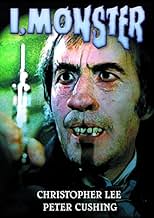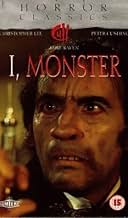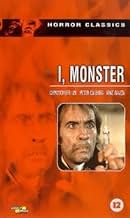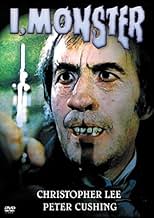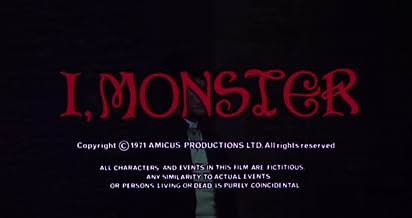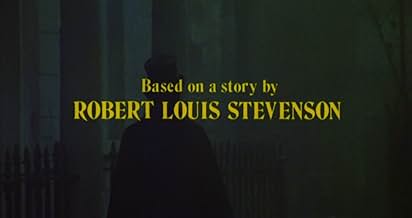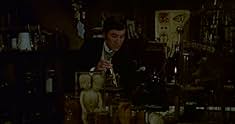IMDb RATING
5.7/10
2.2K
YOUR RATING
19th-century London psychologist Charles Marlowe experiments with a mind-altering drug. He develops a malevolent alter ego, Edward Blake, who his friend Utterson suspects of blackmailing Mar... Read all19th-century London psychologist Charles Marlowe experiments with a mind-altering drug. He develops a malevolent alter ego, Edward Blake, who his friend Utterson suspects of blackmailing Marlowe.19th-century London psychologist Charles Marlowe experiments with a mind-altering drug. He develops a malevolent alter ego, Edward Blake, who his friend Utterson suspects of blackmailing Marlowe.
- Director
- Writers
- Stars
Aimée Delamain
- Landlady
- (as Aimee Delamain)
Jim Brady
- Pub Patron
- (uncredited)
Chloe Franks
- Girl in Alley
- (uncredited)
Lesley Judd
- Woman in Alley
- (uncredited)
Ian McCulloch
- Man At Bar
- (uncredited)
Reg Thomason
- Man in Pub
- (uncredited)
Fred Wood
- Pipe Smoker (with Cap) in Pub
- (uncredited)
- Director
- Writers
- All cast & crew
- Production, box office & more at IMDbPro
Featured reviews
This movie is a version of Dr Jekyll and Mr Hyde as done in a full-on horror treatment by Amicus, in a decade when other versions of the tale appeared (Dr Jekyll and Sister Hyde, Dr Heckyl and Mr Hype ...)
Christopher Lee plays the two-sided character with his usual manic energy, while Peter Cushing is his nemesis, sent to rid the world of the unwelcome evil spirit.
Set in dark corners and oppressive places, the story is given a welcome facelift with the new horror slant. The result is engrossing and enjoyable; this is a good film and a good version of a much-filmed piece.
Christopher Lee plays the two-sided character with his usual manic energy, while Peter Cushing is his nemesis, sent to rid the world of the unwelcome evil spirit.
Set in dark corners and oppressive places, the story is given a welcome facelift with the new horror slant. The result is engrossing and enjoyable; this is a good film and a good version of a much-filmed piece.
I, Monster is a version of Robert Louis Stevenson's 'The Strange Case of Dr. Jekyll and Mr. Hyde' made by Amicus Studios, who were most famous as the horror anthology specialists of British horror. This is one of their standalone entries. Their bigger contemporaries Hammer Studios had in fact released their own version of the famous novella also in 1971, namely Dr. Jekyll and Sister Hyde. Even just going by the title of the latter it's obvious that Hammer were going off on a clearly different angle with their adaption. As far as Amicus version is concerned, it's seemingly one of the most faithful versions of the story ever made. Interestingly, despite the source novella being in the public domain, both the title and character names are quite different. But when you see it, it's pretty obviously the same story. It's not clear why they chose to do this, although it may have been to give the film a slightly fresher feel.
The story has a doctor called Marlowe developing a drug that releases his patient's inhibitions, for example, turning a sexually repressed woman into a nymphomaniac. To further test it he starts taking it himself. It turns him into Mr. Blake an evil man who grows increasingly more physically repulsive the more times he takes a dose. Marlowe is ordinarily a very inhibited and cold man, whereas Blake is libidinous and carefree. Needless to say he is also murderous too and soon there is a manhunt on to discover who is responsible for these crimes.
Amicus made a fairly commendably earnest adaption here it has to be said. The production benefits from some authentic Victorian England locations and like other costume horrors from Britain from the period, its low budget is hidden quite well by the sets and costuming. It also has the two British stalwarts of the genre at its disposal in Christopher Lee and Peter Cushing. Lee has a fair bit to sink his teeth into in this dual role as Marlowe/Blake and he puts in a very good performance. Cushing is solid as he ever is but his role is very run-of-the-mill for him really and he doesn't get to do much beyond what we've seen him do umpteen times. Despite being quite faithful to the original source there are some amendments that have been added to make it slightly more modern such as Freudian theory underpinning things or the fact that Marlowe uses an intravenous drug as opposed to drinking a potion. On the whole though, like lots of these Amicus/Hammer period horrors, this one is solid more than great. There consequently isn't anything too surprising but if you are a fan of the sub-genre then this is certainly a good enough example.
The story has a doctor called Marlowe developing a drug that releases his patient's inhibitions, for example, turning a sexually repressed woman into a nymphomaniac. To further test it he starts taking it himself. It turns him into Mr. Blake an evil man who grows increasingly more physically repulsive the more times he takes a dose. Marlowe is ordinarily a very inhibited and cold man, whereas Blake is libidinous and carefree. Needless to say he is also murderous too and soon there is a manhunt on to discover who is responsible for these crimes.
Amicus made a fairly commendably earnest adaption here it has to be said. The production benefits from some authentic Victorian England locations and like other costume horrors from Britain from the period, its low budget is hidden quite well by the sets and costuming. It also has the two British stalwarts of the genre at its disposal in Christopher Lee and Peter Cushing. Lee has a fair bit to sink his teeth into in this dual role as Marlowe/Blake and he puts in a very good performance. Cushing is solid as he ever is but his role is very run-of-the-mill for him really and he doesn't get to do much beyond what we've seen him do umpteen times. Despite being quite faithful to the original source there are some amendments that have been added to make it slightly more modern such as Freudian theory underpinning things or the fact that Marlowe uses an intravenous drug as opposed to drinking a potion. On the whole though, like lots of these Amicus/Hammer period horrors, this one is solid more than great. There consequently isn't anything too surprising but if you are a fan of the sub-genre then this is certainly a good enough example.
This odd adaption of Dr Jekyll and Mr Hyde was originally shot in a rare form of 3-D which depends on a complicated camera move, much to the annoyance of star Christopher Lee. But it was all worth it, Mr. Lee, because it stands now as your only 3-D movie for us to enjoy today! The 3-D only works when the camera is moving left to right or right to left and you need special glasses (with the right lens slightly darkened) to enjoy it. But in 3-D, the creeping camera moves and slow editing all make sense because the scenes spring to life with deep focussed 3-dimensional action. Now you know why Christopher Lee is always walking up and down his laboratory behind all the chemical glassware!
Brilliant, clever, well-acted adaptation of Robert Louis Stevenson's great The Strange Case of Dr. Jekyll and Mr. Hyde. Dramatized by Amicus producer Milton Subotsky, I, Monster follows the original tale about as closely as any other with some major deviations. The characters in this film are Dr. Marlowe and Mr. Blake(?). Maybe they wanted to separate themselves from the original source material as much as possible or perhaps had a Rights issue. At any rate, I, Monster is a movie that builds and builds as Dr. Marlowe(Christopher Lee) tinkers with this new serum he has created that eliminates one part of the three parts of the brain(according to Freud). The reaction for each individual is different. For Lee, it sheds his formal, authoritative persona of its superego which then allows him to act any way he wants without any moral, ethical, or logical constraints. Lee's transformation is simple, effective, and strong. He goes from the stiff upper lip to the wicked, lecherous, carefree smile of a man of no moral code whatsoever. His eyes dance from one thing to another as the strangely effective music of Carl Davis plays a tune of light madness. Lee gives a great performance in this one and makes the film work. Without his skills, I, Monster would have little else going for it. Yes, Peter Cushing is in it. He plays Marlowe's attorney and is as always very solid in his otherwise mundane role. The rest of the cast is really nothing to speak of either. I have always liked Amicus and most of their horror entries from the late 60's and the 70's. They have the Hammer look about them without Hammer production values: translated that means that they look like Hammer imitations. Nonetheless, they usually have good stories and frequently paired Cushing and Lee together or singly. Subotsky's screenplay is laced with several philosophical layers. Director Stephen Weeks does a solid job behind the camera. For my money, I, Monster is definitely one of the best screen adaptations of Stevenson's work.
This is a version of 'Dr. Jekyll and Mr. Hyde', although the credits ('based on a story by Robert Louis Stevenson'), the name changes (only Utterson and Hyde's first name survive) and the opening 20 minutes (Marlowe's scientific experiments could belong to any similar Hammer film) seem to want to conceal the fact (presumably to make the familiar story unfamiliar again).
Having said that, 'I, Monster' is the most faithful of all adaptations of Stevenson's great novella. There is a little chronological tinkering with narrative, and the setting is moved forward by two decades; but the plot and characters are largely Stevenson's. The error made by most versions of making Jekyll good and Hyde bad is avoided - Jekyll/Marlowe is from the start morose, anti-social, sadistic, voyeuristic and scientifically dubious. There is no Hollywood love-interest, pucelle/putain story to simplify Marlowe's dilemma, retaining the claustrophobic, homosocial world evoked by Stevenson.
Instead of the usual Victorian, cod-Gothic fug, the novella's dream-like modernity is stretched, with effective use made of silence and an unnaturally depopulated urban labyrinth. The transformation scenes, usually an excuse for distracting effects-extravaganza, are brilliantly subtle here, usually off-screen. The 'revelatory' scene (when Blake reveals himself to a friend) is done in silhouette, which is more evocative and thematically appropriate. Christopher Lee's patrician adventurousness is effectively contrasted with Peter Cushing's dogged dullness.
Of course, when I say 'I, Monster' is more faithful than most, it's still not very faithful at all. The duality in Stevenson, whereby Jekyll and Hyde being the same person is concealed till the end, is ignored here. More pertinently, setting the novel in 1906 makes the story seem perversely anachronistic, where Victorian ideas and motifs (sexual repression, duality, mad science etc.) seem out of place in Edwardian England. There is a reason for this - Marlowe is a devotee of Freud, and Jekyll's attempt to isolate, and hence exterminate, the essence of evil, is given a psychoanalytical spin, where the duality is not between respectability and desire, but the ego/super-ego and the Id.
This is interesting for two reasons. Firstly, Freud's ideas of the mind are transferred to the body, giving resonance to Marlowe's physical changes, the animal imagery throughout, and the violence he inflicts, as well as making more poignant the climactic 'melding', where Marlowe can no longer divorce his dark side at will. Secondly, Freud provides an explanatory framework for the story, most notably an Oedipal one. Blake runs riot with a cane that reminds Marlowe of the one his violent, 'respectable' father used; the absence of women in his social world, his horrifying violence to women, and some of the seemingly irrelevant asides (the photos that loom in his room like an invading army, etc.) all suggestively deepen our reaction to Marlowe's plight.
This Amicus production is reminiscent of the best Hammers - eg 'The Creeping Flesh' - where the emphasis is less on gore and sensation than suggestion, atmosphere, or slow menacing camerawork; a meaningful use of decor; dream-like sequences; elliptical editing; rich symbolism.
And as with those great Hammers, there are some searing set-pieces - the opening credits in Marlowe's laboratory, with its dead Siamese twin foetuses, its caged animals and images of fragmentary body parts; Marlowe's first injection and 'self-discovery' with the mirror (more Freud via Lacan) and 'new' point of view; the knife tussle at dawn in a narrow lane in a proletarian milieu; the voyeuristic scenes in his adopted hotel room, with its low-level, tilted camera; the social humiliation when he tries to pick up a prostitute, suggesting he hasn't quite overthrown the sensitive super-ego; the trampling of a young girl. Lee, usually so authoritarian and calm, gets a rare chance to be weak and is excellent; his hurt at having to kill his tabby is very moving. Also excellent is the score, ironic and commentating rather than underpinning or atmospheric; frequently comic, but never - ever - spoofy.
Having said that, 'I, Monster' is the most faithful of all adaptations of Stevenson's great novella. There is a little chronological tinkering with narrative, and the setting is moved forward by two decades; but the plot and characters are largely Stevenson's. The error made by most versions of making Jekyll good and Hyde bad is avoided - Jekyll/Marlowe is from the start morose, anti-social, sadistic, voyeuristic and scientifically dubious. There is no Hollywood love-interest, pucelle/putain story to simplify Marlowe's dilemma, retaining the claustrophobic, homosocial world evoked by Stevenson.
Instead of the usual Victorian, cod-Gothic fug, the novella's dream-like modernity is stretched, with effective use made of silence and an unnaturally depopulated urban labyrinth. The transformation scenes, usually an excuse for distracting effects-extravaganza, are brilliantly subtle here, usually off-screen. The 'revelatory' scene (when Blake reveals himself to a friend) is done in silhouette, which is more evocative and thematically appropriate. Christopher Lee's patrician adventurousness is effectively contrasted with Peter Cushing's dogged dullness.
Of course, when I say 'I, Monster' is more faithful than most, it's still not very faithful at all. The duality in Stevenson, whereby Jekyll and Hyde being the same person is concealed till the end, is ignored here. More pertinently, setting the novel in 1906 makes the story seem perversely anachronistic, where Victorian ideas and motifs (sexual repression, duality, mad science etc.) seem out of place in Edwardian England. There is a reason for this - Marlowe is a devotee of Freud, and Jekyll's attempt to isolate, and hence exterminate, the essence of evil, is given a psychoanalytical spin, where the duality is not between respectability and desire, but the ego/super-ego and the Id.
This is interesting for two reasons. Firstly, Freud's ideas of the mind are transferred to the body, giving resonance to Marlowe's physical changes, the animal imagery throughout, and the violence he inflicts, as well as making more poignant the climactic 'melding', where Marlowe can no longer divorce his dark side at will. Secondly, Freud provides an explanatory framework for the story, most notably an Oedipal one. Blake runs riot with a cane that reminds Marlowe of the one his violent, 'respectable' father used; the absence of women in his social world, his horrifying violence to women, and some of the seemingly irrelevant asides (the photos that loom in his room like an invading army, etc.) all suggestively deepen our reaction to Marlowe's plight.
This Amicus production is reminiscent of the best Hammers - eg 'The Creeping Flesh' - where the emphasis is less on gore and sensation than suggestion, atmosphere, or slow menacing camerawork; a meaningful use of decor; dream-like sequences; elliptical editing; rich symbolism.
And as with those great Hammers, there are some searing set-pieces - the opening credits in Marlowe's laboratory, with its dead Siamese twin foetuses, its caged animals and images of fragmentary body parts; Marlowe's first injection and 'self-discovery' with the mirror (more Freud via Lacan) and 'new' point of view; the knife tussle at dawn in a narrow lane in a proletarian milieu; the voyeuristic scenes in his adopted hotel room, with its low-level, tilted camera; the social humiliation when he tries to pick up a prostitute, suggesting he hasn't quite overthrown the sensitive super-ego; the trampling of a young girl. Lee, usually so authoritarian and calm, gets a rare chance to be weak and is excellent; his hurt at having to kill his tabby is very moving. Also excellent is the score, ironic and commentating rather than underpinning or atmospheric; frequently comic, but never - ever - spoofy.
Did you know
- TriviaChristopher Lee (Dr. Charles Marlowe / Mr. Edward Blake) previously played Paul Allen in Les Deux Visages du Dr Jekyll (1960), another film adaptation of Robert Louis Stevenson's 1886 novella "Strange Case of Dr. Jekyll and Mr. Hyde."
- GoofsAt c. 53:00 into the film, Utterson says he would recognize the exact details of the ornate head of Blake's cane. However, he has only seen this cane for a fraction of a second at nighttime, when it was used to assault him earlier in the film.
- Quotes
Dr. Charles Marlowe: The face of evil is ugly to look upon. And as the pleasures increase, the face becomes uglier.
- Alternate versionsOn Blu-ray, the film was released for the first time by Powerhouse Films in the UK. In addition to the theatrical version, there is the option to watch the extended version, which features two additional scenes. You can see Marlowe working in the lab, more conversations in the club and a conversation of Marlowe with his patient Diane. The scenes mainly deepen the theme of human duality, but are not strictly necessary.
- ConnectionsFeatured in The Many Faces of Christopher Lee (1996)
- SoundtracksEine Kleine Nachtsmusik
By Wolfgang Amadeus Mozart (uncredited)
- How long is I, Monster?Powered by Alexa
Details
- Runtime
- 1h 15m(75 min)
- Aspect ratio
- 1.85 : 1
Contribute to this page
Suggest an edit or add missing content


